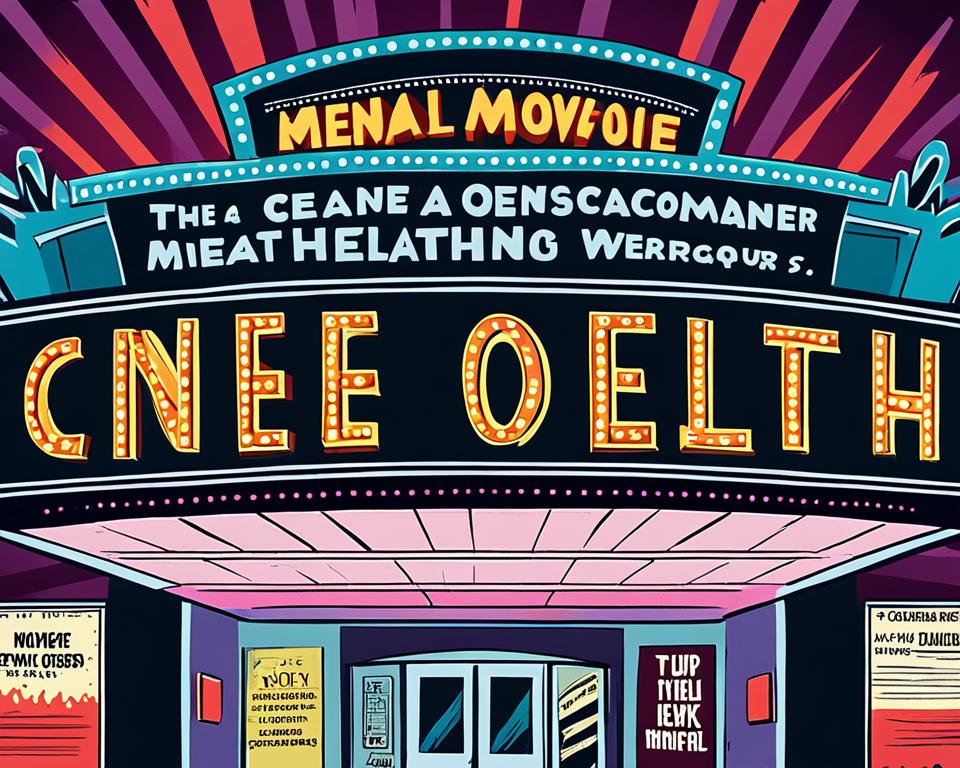Millions of people are affected by mental illness, with approximately 1 in 5 adults in the United States living with a diagnosed condition, according to the National Institute of Mental Health. However, mental health conditions are not frequently portrayed on the big screen. In a joint report by the University of Southern California (USC) Annenberg Inclusion Initiative, the American Foundation for Suicide Prevention, and the David and Lura Lovell Foundation, it was found that movies that do portray mental health conditions vary in their accuracy and sensitivity. Some storylines stigmatize mental health conditions, while others accurately depict the challenges and experiences of individuals with mental health concerns. In this list of movies, we have curated a selection that discusses a wide range of mental health issues with care and accuracy.
Key Takeaways:
- Mental health conditions are not frequently portrayed on the big screen.
- Movies about mental health vary in their accuracy and sensitivity.
- Some movies stigmatize mental health conditions while others depict them accurately.
- We have curated a list of movies that discuss a wide range of mental health issues.
- These movies aim to bring awareness and understanding to mental health concerns.
Table of Contents
‘Silver Linings Playbook’
“Silver Linings Playbook” is a captivating film that explores the lives of two individuals dealing with mental health challenges. Pat Solitano Jr., portrayed by Bradley Cooper, grapples with bipolar disorder, while Tiffany Maxwell, played by Jennifer Lawrence, faces her own unnamed mental health condition. The movie provides an accurate and sensitive depiction of bipolar disorder, shedding light on the complexities and struggles faced by individuals living with this condition.
The film emphasizes the need for treatment and medication, highlighting the importance of professional help in managing bipolar disorder. The character of Pat showcases the internal battles and limited but present insight experienced by someone with this disorder. Psychiatrist Steven Schlozman, MD, commends the portrayal, noting the film’s insightful depiction of the challenges and realities of manic depressive illness.
‘A Beautiful Mind’
“A Beautiful Mind” is a powerful film that tells the true story of mathematician John Forbes Nash Jr., who lived with schizophrenia. The movie provides a compelling and accurate depiction of the progressive mental health condition and the impact it had on Nash’s life and career. Through its portrayal, the film challenges stigmas and misconceptions surrounding individuals with mental health conditions, highlighting their intelligence and teachability.
The portrayal of schizophrenia in “A Beautiful Mind” showcases the complexities of the illness, including the experiences of paranoia and delusions. The film offers an insightful look into the challenges faced by Nash and those around him, highlighting the importance of support and understanding in the journey of mental health recovery.
‘The Great Depresh’
“The Great Depresh” is an HBO special that masterfully combines documentary elements with stand-up comedy. Comedian Gary Gulman fearlessly takes viewers on his personal mental health journey, sharing his experiences with depression and anxiety. This groundbreaking special provides a raw and authentic look at the realities of mental health struggles, including Gulman’s own journey through psychiatric hospitalization and the utilization of treatment methods like electroconvulsive therapy.
Gulman’s storytelling skills and comedic timing shine as he skillfully intertwines humor with poignant moments of reflection. Through his vulnerability and honesty, he shows that comedy can serve as an effective tool for healing and raising awareness about mental health.
“The Great Depresh” offers a unique perspective, showcasing the power of comedy in destigmatizing mental health and depicts the triumphs and challenges of navigating daily life with a mental health condition. Gulman’s journey through comedy serves as an inspiration to viewers, demonstrating that with proactive management and support, it is possible to lead a fulfilling life despite mental health struggles.
Comedy as a Gateway to Healing
One of the most intriguing aspects of “The Great Depresh” is its exploration of how comedy can act as a healing mechanism for individuals with mental health concerns. Gulman’s ability to transform his pain into laughter establishes a connection with the audience, creating a space where difficult topics can be openly discussed and understood.
The special highlights the power of laughter as a form of therapy, as it allows individuals to find solace, share experiences, and reduce the stigma surrounding mental health. Through his clever wit and relatable anecdotes, Gulman shows that even dark and challenging moments can be confronted with humor, fostering resilience and hope.
An Authentic Mental Health Journey
What sets “The Great Depresh” apart is its authenticity. Gulman’s openness about his own mental health struggles creates an intimate connection with the viewers, instilling a sense of empathy and understanding. By sharing his story, he encourages others to recognize their own experiences and seek help when needed.
The special addresses the complexities of mental health in a relatable and accessible way. It reveals the challenges of navigating psychiatric hospitalization, the fear and stigma associated with it, and the various treatment methods available. Gulman’s journey through depression demonstrates that mental health is a journey, and seeking professional help is crucial in finding a path towards recovery.
“The Great Depresh” ultimately showcases the transformative power of comedy and storytelling in illuminating the realities of mental health challenges. It serves as a reminder that we are not alone in our struggles and that there is hope and healing to be found.
‘Love Actually’
“Love Actually” is a popular romantic comedy that weaves in hidden storylines about mental illness. While the film primarily focuses on love and relationships during the holiday season, it discreetly addresses the challenges faced by individuals and their loved ones dealing with mental health conditions.
One such hidden storyline revolves around the character Sarah, played by Laura Linney. Sarah lives with the secret that her brother has schizophrenia and is in a psychiatric facility. Throughout the movie, Sarah’s dedication to caring for her brother while trying to maintain a personal life showcases the complexities and sacrifices of supporting someone with a serious mental health condition.
By subtly highlighting the emotional toll and lack of support experienced by caregivers, “Love Actually” sheds light on a critical aspect of mental health that is often overlooked in mainstream media. It encourages viewers to consider the multifaceted nature of mental illness and the vital role played by those who provide care and support to individuals living with such conditions.
Movies like “Love Actually” play a valuable role in raising awareness and promoting dialogue about mental health. By incorporating mental health storylines into popular genres like romantic comedies, these films reach wider audiences and challenge societal stigmas. Through relatable characters and engaging narratives, they foster understanding, empathy, and compassion for individuals facing mental health challenges and those who care for them.
As we continue to advocate for mental health awareness and destigmatization, it is crucial that movies like “Love Actually” and others with hidden mental health storylines are recognized for their contribution to the representation of caring for someone with a mental health condition in popular culture.
‘Ordinary People’
Directed by Robert Redford, the film ‘Ordinary People’ is a profound exploration of the aftermath of loss and trauma. It delves into the heartbreaking journey of the Jarrett family, who grapple with the accidental death of their eldest son and the subsequent suicide attempt of their younger son.
‘Ordinary People’ offers a raw and honest portrayal of the devastating impact of loss and trauma on individuals and families. The film skillfully captures the breakdown of relationships within the family as they navigate the complex emotions and challenges that follow such tragic events.
What sets ‘Ordinary People’ apart is its focus on the experiences of suicide loss survivors. Rather than sensationalizing the act itself, the film emphasizes the long-lasting repercussions on those left behind. It sheds light on the struggles faced by suicide loss survivors, highlighting the importance of understanding and supporting them throughout their healing journey.


